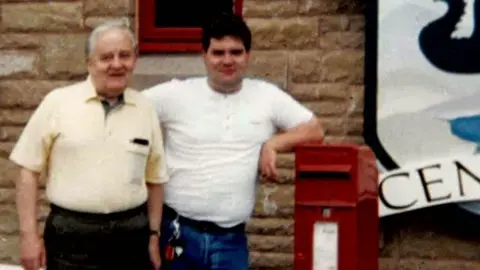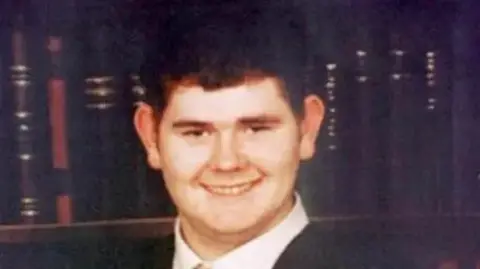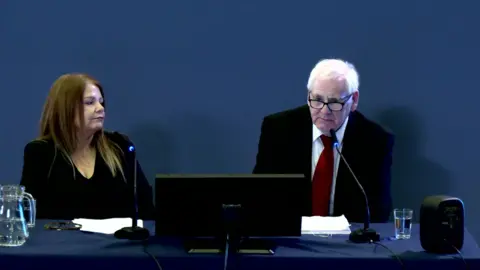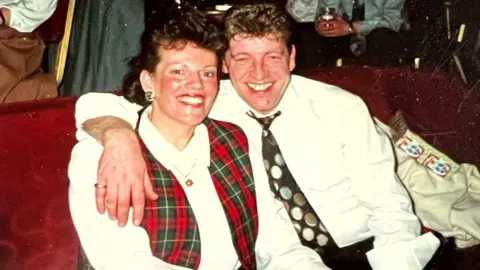BBC News NI, in Omagh
 White Family
White FamilyA woman whose husband and son died in the Omagh bombing has told an inquiry she drove around looking for them for years because she could not accept their deaths.
Edith White’s 60-year-old husband Fred and Bryan, 27, had gone into the County Tyrone town to shop on the day of the 1998 attack.
The Real IRA drove a car bomb into the centre of Omagh which exploded, killing 29 people including a woman pregnant with twins.
Mrs White is among the victims’ relatives who are giving personal testimonies about their loss at the start of a public inquiry into the bombing.
Fred and Bryan White had just returned from holiday the day before and the inquiry was shown a photograph of them smiling and relaxed on the final day of that trip.
Within 24 hours they would both be dead.
Belongings untouched
“I just couldn’t accept that they were gone. I don’t understand why they had to be murdered,” Mrs White said.
“For a number of years after the bomb, I would still go in the car to look for them, thinking that they must be somewhere.
“Whenever I saw a black Ford car I would look to see if it’s the number plate of Fred’s car.”
She added that she left their personal belongings, like toothbrushes and diaries, untouched for many years after the bomb.
“I regularly would have changed the sheets on Bryan’s bed. But they never came home and the silence is still there.”
Mrs White said she visited their grave twice a day for many years.
She said she has felt anger over the years because of the “delay and failure” to get answers about how the atrocity could have happened.
“I am lost without my husband and son. I can still picture Bryan on the day of the bomb and telling me he would be back in a while.
“Fred was my rock and I loved him dearly.”
Bomb was ‘declaration of war’ on civilians
 Family handout
Family handoutCampaigner Michael Gallagher, whose son was killed in the bomb, said the attack was a declaration of war by the Real IRA on an unsuspecting civilian population for their own political aims.
His son 21-year-old son Aiden had gone into the town to buy jeans when he was caught up in the blast.
Mr Gallagher said the dissident republican group described themselves as “freedom fighters” but they were far from it.
He told the inquiry: “They are freedom takers, the victims have ended up being the freedom fighters.”
Aiden worked as a mechanic and was fascinated with cars and aircraft.
“He had a very wide group of friends and I’m very proud to say that we live in a country where there’s a lot of division and bigotry on both sides, but we never allowed that to penetrate our family,” Mr Gallagher told the inquiry.
“We chose our friends because of the contents of their heart, not because of their religion or their politics.”
The inquiry heard the Gallagher family had previously suffered a bereavement 14 years earlier as a result of the Troubles in Northern Ireland.
Michael Gallagher’s younger brother Hugh was murdered by the IRA in 1984.
The Omagh bomb exploded four months after the signing of the 1998 Good Friday Agreement – a peace deal designed to bring an end to 30 years of violence.
‘The first atrocity of peacetime’

Mr Gallagher said the timing of the bombing was “absolutely cruel”.
“People often describe the Omagh bomb as the worst of the Troubles, it was actually the first atrocity of peacetime,” he said.
Aiden had gone in to Omagh town centre to buy new jeans. His father said his last words were: “I won’t be long.”
Michael Gallagher heard the blast and knew it was a bomb.
After several journeys into town, to the hospital, he was eventually taken to a makeshift morgue where he identified his son’s body.
His “greatest concern” driving home as dawn was breaking, was how he was going to tell his family that Aiden would not be coming home.
“That was extremely painful and difficult. In the end I didn’t really need to say anything.”
‘You could feel death in the air’
 McCombe family
McCombe familyThe husband of Omagh bomb victim Ann McCombe described her as a “wonderful and very, very caring person” during the inquiry.
“I suppose that is why I fell in love and married her. I think she was the kindest hearted person that I have ever known and she cared for everybody.”
Stanley McCombe and his son Clive were at a pipe band championship in Scotland when news of the explosion broke.
Mr McCombe described their nightmare journey home.
“When we arrived home on the Sunday you could feel death in the air… It was a very strange feeling, everything was so still, you did not hear a dog barking or a car and there was nobody about, everybody had just disappeared.”
Clive McCombe said all of their lives changed after the bomb.
“I miss my mother every day. I try as best as I can to live life in a way to make her proud,” he said.
“My mother would always say: “If you can be anything, be kind.”
Stanley McCombe also said in his statement that the aftermath of Dame Nuala O’Loan’s report where she found the Omagh bombing had been preventable, was “unbearable”.
“It became obvious to me and many of the families that we as victims were secondary.”
He said it had made him more “resolute” in his desire for a public inquiry.
#Omagh #bomb #widow #couldnt #accept #deaths #husband #son



